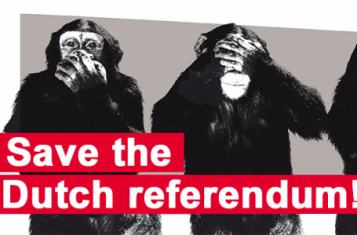"In July 2015, the Consultative Referendum Law entered into force in the Netherlands. It gives 300,000 citizens the right to trigger a national non-binding referendum on laws and treaties. The initiators of the law – among them the founders of the Dutch NGO Meer Democratie (“More Democracy”) – also introduced a constitutional change proposal in parliament that would make the referendum binding. But as the necessary two-third majority for this was and is nowhere in sight, they opted to also introduce a non-binding version that could be arranged in a regular law.
In April 2016, the first referendum on the basis of this law took place, about the Association Treaty between the EU and the Ukraine. A majority of 61% voted against while a large majority of parliament had voted in favor. Many politicians hated the referendum. They claimed people had voted no for reasons that had nothing to do with the Association Treaty, even though research by political scientists disproved this. They also decried that the initiators were “against the EU”, even though this is irrelevant for the content of the referendum and the motives of the voters.
The new Dutch government is now trying to get rid of the referendum law. As they knew that triggering referendum on the abolishment of the referendum is legally possible, and Meer Democratie and other groups had already announced that they would do just that, they came up with dirty legal tricks to block a referendum on the referendum. Most importantly, they plan to let the Repeal Law that abolishes the referendum, to go into effect retroactively. In plain words, their plan is that the Repeal Law, when it will come into being, travels back in time to wipe out the time frame in which citizens can hand in the signatures for a referendum on the referendum.
The government has been heavily criticized for this move by the media, professors of state law and political science, the public and even by political parties who are against referendums but think the government should follow the law and refrain from dirty legal tricks. But it is turning a deaf ear. The government parties in the lower house of parliament have already approved this move and in April or May, the Senate will take the final decision.
Besides a lobby and publicity campaign, Meer Democratie has started two crowdfunded court cases to demand that the government respects the referendum law, which says (in article 8) that any attempt to let a new law – including the Repeal Law – enter into force before citizens have had the opportunity to request a referendum, is legally void. We have no legal basis to demand that the government does not abolish the referendum. But we can demand that the government does not place itself above the law and allows a referendum. And we have warned the Senate that if they too decide to abolish the referendum law, and a judge will rule in favor of our complaint even if this takes another four years and/or an appeal to the higher courts, then the Repeal Law has never entered into force and citizens have a right to retroactively request referendums on all laws and treaties that have been passed until that moment.
We aren’t sure that we will win. But we are sure that we will fight until the end."


